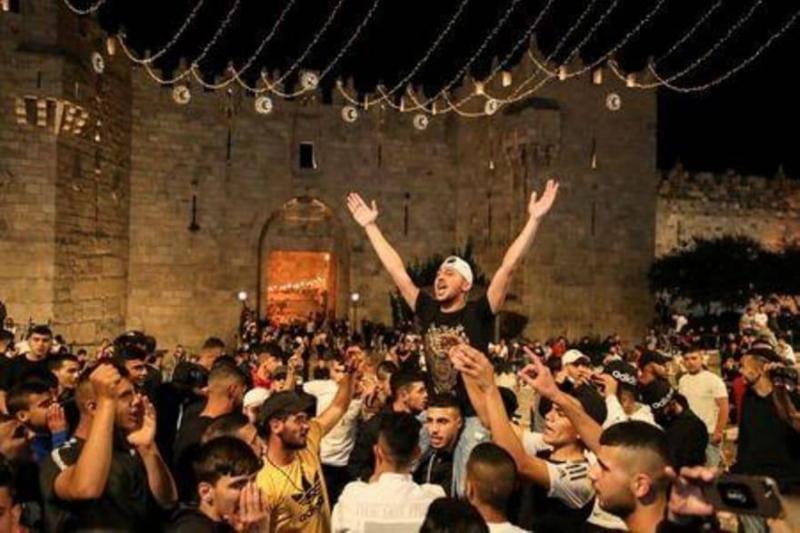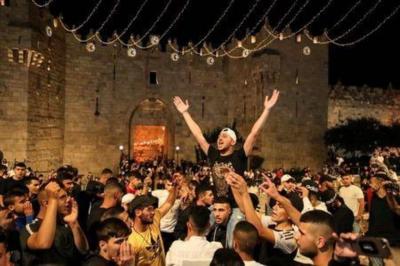Palestinians gathered to celebrate outside the Damascus Gate in East Jerusalem on Sunday evening after the removal of barriers set up by Israeli police, allowing them to enter a square that had become a hotspot for clashes during Ramadan nights. The square was filled with thousands of Palestinians on Sunday evening, cheering and chanting, with some waving Palestinian flags, as police permitted their entry to the Old City of Jerusalem, a popular gathering place during Ramadan nights. Clashes erupted after Israeli police moved into the crowd to confiscate flags.
Arab Knesset member Ahmad Tibi stated during the celebrations, which continued into the early hours of Monday, that the decision to place the barriers was a mistake from the outset. He told Reuters that the decision to reopen was correct, but “they must stop attacking Palestinians.” The clashes coincided with the start of Ramadan on April 13, escalating tensions in the holy city.
Conflicts occurred between stone-throwing youths and riot police attempting to disperse them using horses and water-throwing vehicles. The unrest spread to the West Bank, where protests were held in solidarity with the residents of East Jerusalem, and armed Palestinian groups launched dozens of rockets from Gaza towards Israel. Violence peaked on Thursday, when Palestinian medics reported 100 injuries, while Israeli police arrested more than 50 demonstrators amidst a march organized by hundreds of far-right Israelis towards Damascus Gate, chanting “Death to the Arabs.”
Violence subsided on Saturday and Sunday. Social media footage on Sunday showed Palestinians removing barriers after Taraweeh prayers, but Israeli police stated they had ordered their removal in light of "unprecedented events" in recent days. An Israeli police spokesperson told Reuters, "Orders were given to remove the barriers after consultations with religious authorities, local leaders, and shop owners." He added that the decision was made "to ensure peace and security for everyone" in Jerusalem.
Increased calls for calm followed international appeals for tranquility, amid fears that clashes could spiral out of control, given Jerusalem's status as a major flashpoint in the Israeli-Palestinian conflict. The primary cause of the unrest was Palestinian anger over the Israeli police’s decision to prevent crowds from gathering outside Damascus Gate. At the same time, social media videos reportedly showing Palestinian youths attacking extremist Jews sparked protests from Israelis and calls from far-right politicians for harsher police measures.
Hussein Hamayel, a spokesperson for the Palestinian Fatah movement, praised the removal of the barriers, stating it demonstrated "the strength and steadfastness of our great people" against Israel, its army, and settlers. In Gaza, Hamas spokesperson Hazem Qassem lauded the barrier removal, saying, “The occupation police removed their barriers at Damascus Gate after the uprising of the young Jerusalemites.”
The Israeli military stated late Sunday that Palestinian militants had launched a new rocket towards Israel, but it exploded in Gaza before reaching its target. Israel announced it would restrict the fishing area in the Gaza Strip from 15 nautical miles to nine miles due to the continued rocket fire, effective from 6 a.m. until further notice.




